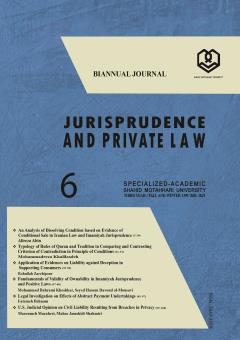-
-
-
Open Access Article
1 - Delivery of Goods for Future Transaction and Its Guarantee Based on Imamiyah Jurisprudence and Positive Laws (ius positum)
Seyed Mohammad Sadeq Mousavi Maryam PourtolueiWhen a commodity is submitted by the owner to the other party for future transaction, the mutual relations can be in the form of contract, unilateral obligation or mere authorization. Therefore, the nature of this relationship depends on the intention of the parties and MoreWhen a commodity is submitted by the owner to the other party for future transaction, the mutual relations can be in the form of contract, unilateral obligation or mere authorization. Therefore, the nature of this relationship depends on the intention of the parties and there is no obstacle according to Sharia law to it. The practice has some effects and it is necessary to identify these effects in order to determine the type of relationship of the transactors and arbitration between them. Guarantee on damage or loss of the commodity is one of the guarantees that in view of some jurists is the owner’s obligation, while some consider it that of the receiver. However, since the owner delivers the commodity to the other party upon his will, it is unlikely to consider the receiver responsible unless in wasting commodity or in encroachment. Therefore, guaranteeing the commodity in case of damage or loss is on the owner. Upon evaluation of various views on the nature and impact of the said institution, in this paper all aforesaid views can be taken as one. In this case, the probable problems for the traders in this area will be removed and the ground will be prepared for a fair arbitration between them. Manuscript profile -
Open Access Article
2 - Explanation of Legal Principle of “Everything that is known only by claimant will be heard” and Its Application in Iranian Legal Code
Seyed Mohammad Sadeq Mousavi Seyed Omid MousaviAbstract: The legal principle of “Everything that is known only by claimant will be heard”, briefly known as the “maa laa ya’lam” is among legal principles that helps settlement of certain legal claims. Some cases are known only to the claimant due to confidentiality. T MoreAbstract: The legal principle of “Everything that is known only by claimant will be heard”, briefly known as the “maa laa ya’lam” is among legal principles that helps settlement of certain legal claims. Some cases are known only to the claimant due to confidentiality. Therefore, it is impossible to present evidence at the court for such claims. The legal principle of maa laa ya’lam (transliterated as what he does not know) is used to help resolving the case and the only solution is accepting the claimant’s claim without evidence. According to the related exhibits and evidences, this is a well-proven legal principle that has been invoked by the Infallible Household of the Prophet (pbuh) and Muslim jurists have made frequent mentions of it in their books. Instances of this legal principle’s effectuality can be found in various civil rights and penal codes. For instance, in civil rights, the principle is used in such claims on marriage, menstruation and payment of various dues, and also in penal code, it is used in case of presenting proof of no adultery. Manuscript profile
List of Articles Seyed Mohammad Sadeq Mousavi
-
The rights to this website are owned by the Raimag Press Management System.
Copyright © 2017-2024


